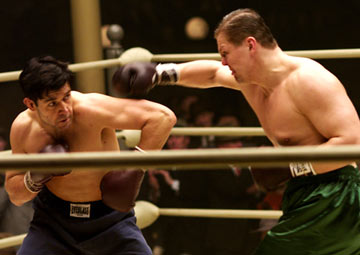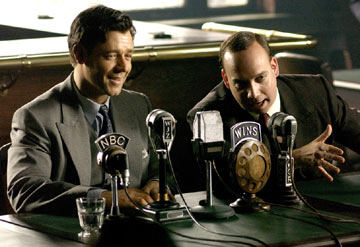Rating
-

Cast & Crew
info:
Russell Crowe
Jim Braddock
Renée Zellweger
Mae Braddock
Paul Giamatti
Joe Gould
Craig Bierko
Max Baer
Paddy Considine
Mike Wilson
Bruce McGill
Jimmy Johnston
Produced by Brian Grazer, Todd Hallowell, Ron Howard
and Penny Marshall; Directed by Ron Howard; Written
by Cliff Hollingsworth and Akiva Goldsman
Drama (US); 2005; Rated PG-13 for intense boxing violence
and some language; Running Time: 144 Minutes
Official
Site
Domestic Release Date:
June 3, 2005
Review Date
06/14/05 |
 Written
by DAVID KEYES Written
by DAVID KEYES Family
man and all-around nice guy Jim Braddock lugs around enough
nobility to put most guys to shame, the task on his shoulders
so physically demanding and uncertain that it's a wonder
he is able to go home at night and be halfway civil to his
children and wife. Reality is certainly not in his favor;
a successful prize fighter whose golden days dissipate just
as the clout of the Great Depression is set into motion,
his life both in and out of the ring are sent into major
freefall, a predicament that would be more than enough to
cripple any man emotionally. But no, here is a guy who projects
the ideals of the working class and an attitude of optimism
so resolute that he refuses to cave. For him, failure is
not only not an option, but a completely foreign concept.
Maybe that is what drives him down a road of new opportunities
and success, or maybe it is just sheer luck. In any case,
this is the kind of guy whose ambition is just as great
as his dignity, and when put to the test he faces those
dilemmas like they are nothing more than challengers in
a ring begging for a knockout.
Moviegoers
have love affairs with heroes like these, the kind that
seem to live in our shoes and share our problems on a daily
basis before ultimately triumphing in the end amidst all
sorts of conflicting energy. Director Ron Howard has identified
that perception more than once in his career, and he explores
it yet again in his latest endeavor "Cinderella Man,"
a biopic about boxer Jim Braddock's rise, fall and rise
again to the top of his profession. Laced with the same
undertone that drives most films of this genre, it has just
as much in common with traditional boxing movies, perhaps,
as it does with "Seabiscuit," another film about
people rooting for an underdog while the Great Depression
crushes their personal dreams. Is there much difference?
Maybe not. With a horse you don't always see yourself as
sympathetic, but in both cases you usually find yourself
rooting for the one that all odds are against.
Braddock
is played here by Russell Crowe, whose recent vacation from
acting has seemingly helped recharge his on-screen persuasiveness.
At the start of the film Braddock is relishing victory from
a prize fight, an occasion that is made all the more sweet
by the fact that he is welcomed home, quite warm-heartedly,
by a devoted wife (Renée Zellweger) and three high-spirited
kids. Their happiness is contrasted quite strikingly with
what occurs shortly thereafter - after the inevitable stock
market crash of 1929, Jim now works an occasional shift
at the loading docks, struggling to make ends meat in order
to keep a roof over the heads of his loved ones. Gone too
is the hard-earned reputation he earned in the ring; barely
a draw even at local low-key matches, his license is revoked
once his superiors start to see just what kind of financial
loss his presence is causing them. Stress from professional
struggles also spill over into his personal life, as Jim
and his wife Mae argue over what is more beneficial to their
children: sending them away to be with financially stable
relatives, or keeping them in a damp environment where they
are subject to illness just because daddy promised them
that the family would never split up.
And
here we have the stage set for what will slowly but surely
become a story about personal rebirth and success, a prospect
that is further enhanced by the notion that writers Cliff
Hollingsworth and Akiva Goldsman are working with a script
that, more or less, probably does not stray too far from
the way events really happened. Jim's friend and booking
manager Joe Gould (Paul Giamatti) arrives one day and drops
an unexpected one-shot boxing job in his lap, which guarantees
the fighter a $250 purse regardless of the outcome. Everyone
expects Braddock to just merely enter the ring and take
a few hits, as he usually has done in recent years. The
shocker: when he starts throwing punches again, it's as
if the golden boy from years ago never left the ring. He
wins the fight. Onlookers buzz with excitement. The investors
offer to renew his license, and new fights come his direction.
"Is it a comeback?", press headlines suggest,
perhaps not-so-prematurely. If it is, his wife Mae's concern
for his safety is certainly drowned out by his own renewed
enthusiasm for the support, which he sees as the only light
at the end of a long dark tunnel to try and get his family
back in a stable lifestyle.
 As
a vehicle for a man like Ron Howard, a director who is more
successful in drawing strength from good performances rather
than lasting stories, "Cinderella Man" may indeed
be his, well, Cinderella story. The movie's appeal is broad
and inviting, with a narrative that gets you to care about
characters and situations just as much as it gets you involved
in the fights themselves, and social underpinnings that
are recognized (and accepted) at face value. The movie also
draws strength from a few excellent performances, which
is the least of the surprises - Crowe for one does a convincing
job of mastering the persona of a guy who is loved just
because he reminds us so much of ourselves, and Giamatti
and Zellweger both deliver respectable supporting work in
a movie that could have easily used them as mere props to
a much stronger central character. Their work is further
enhanced by a technical approach that adds tension to their
inner drama, especially when, during a climax involving
a face-off with boxing champ Max Baer (Craig Bierko), the
camera rapidly cuts through the action of the ring as punches
are exchanged at an alarming rate. The result is probably
the most realistic-looking fighting you will see in a movie
next to Clint Eastwood's "Million Dollar Baby." As
a vehicle for a man like Ron Howard, a director who is more
successful in drawing strength from good performances rather
than lasting stories, "Cinderella Man" may indeed
be his, well, Cinderella story. The movie's appeal is broad
and inviting, with a narrative that gets you to care about
characters and situations just as much as it gets you involved
in the fights themselves, and social underpinnings that
are recognized (and accepted) at face value. The movie also
draws strength from a few excellent performances, which
is the least of the surprises - Crowe for one does a convincing
job of mastering the persona of a guy who is loved just
because he reminds us so much of ourselves, and Giamatti
and Zellweger both deliver respectable supporting work in
a movie that could have easily used them as mere props to
a much stronger central character. Their work is further
enhanced by a technical approach that adds tension to their
inner drama, especially when, during a climax involving
a face-off with boxing champ Max Baer (Craig Bierko), the
camera rapidly cuts through the action of the ring as punches
are exchanged at an alarming rate. The result is probably
the most realistic-looking fighting you will see in a movie
next to Clint Eastwood's "Million Dollar Baby."
Alas,
to bring that film up here is to also point out some serious
problems with Howard's work. Having been only a few months
since release, Eastwood's Oscar-winning tragedy is still
fresh in our minds, its resounding bravery and brilliance
just as unforgettable now as it was on first viewing. It
is exactly that great payoff, though, that somewhat deadens
the effect of "Cinderella Man." Not only is the
movie inferior in comparison, but also far more traditional;
whereas "Baby" took a courageous step with its
story, this film opts to stay within the studio formula
and abide by the rules of your average crowd-pleaser. It
takes very few risks. That does not necessarily undermine
the work completely, but it does raise a few concerns. Are
Howard and Goldsman trying to replicate their success of
"A Beautiful Mind" here by following its trajectory?
It would appear so. From beginning to end, no matter how
far it goes or how hard it tries, there is always this nagging
sense in the back of your mind that you are watching yet
another elaborate Academy Award trap unfold on screen.
Still,
to be an audience-grabber at the heart is not always a pointless
concept, and here the director and writers prove that the
formula still has a few kicks to it. "Cinderella Man"
is certainly no "Million Dollar Baby," but with
an observant story arc and lots of well-acted moments, it's
hard to hold that aspect against it for long.
© 2005, David Keyes, Cinemaphile.org.
Please e-mail the author here
if the above review contains any spelling or grammar mistakes. |





